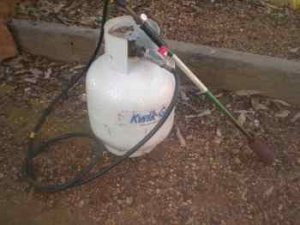| item(s), Total: $0.00 View Cart |
| Shopping cart is empty. |
Organic Weed Control

WEEDS - WHAT TO DO ABOUT THEM?
Every autumn and winter, the ground at our place seems to spring to life. While we struggle to keep things alive in summer, and the earth is brown and dry - come the first rains the landscape suddenly changes, and before we know it we are surrounded by lush, green growth.
The trouble is, that lush green growth is weeds.
Wintergrass, oxalis, cape weed, flat weed, fumaria, onion grass - they're all here - and more varieties I don't even know the names of!
I'm guessing if you're reading this - you have weed problems too!
As an organic gardener in Perth, there are things to do to control weeds. You don't have to resort to using Glysophate. This herbicide, touted as being safe and biodegradeable really doesn't have such a good name if you take the time to look into research around the world. Why take the chance? Let's look at what else you can do to keep weeds under control. Methods of Organic Weed Control include:
1. Outcompete
Weeds will always emerge strongly in a barren piece of land; and particularly disturbed ground which has been dug over, or new soil put down and left. This is because the surface is lovely and friable, meaning seeds which blow in the wind can easily germinate and get good root penetration. In hard, compacted areas where there is regular traffic, weeds don't tend to grow so readily. So outcompete weeds by growing something else. Look for spreading, quick growing groundcovers. There are a huge range available. Native plants, flowering plants, rockery plants, succulents, and also herbs and edibles. If it is an area which you are wanting to plant into - but not just yet - consider a green manure crop or a flowering annual; something that can grow quickly but will be short lived or 'disposable'. There is a saying - nature abhors a vacuum. So quite simply - don't leave any vacuums!
2. Vigilance
They say one year's seed = seven years' weed. Whether or not this is true, it certainly feels like it is! Tackle weeds when they are small. Remove them quickly before they spread too much. Either hand weed, or hoe them into the ground. If the area is far too big - then at the very least whippersnip them before they flower and set seed. Weeds will try to push out more seeds when you do this - so you may need to do it two or three times, a week or so apart. Each time you do however, the plant's vitality is greatly depleted. Each subsequent lot of seeds the weed is trying to produce will become smaller as the plant uses up vital life force.
3. Solarisation
This method is reliable and easy to do even in large areas, but you do need patience as it will take several weeks – 4 - 6 in summer, 8 – 10 in winter.
Slash or mow weeds, and remove rocks and large debris from the area. Damp area down slightly – moisture helps the ‘cooking’. Throwing a handful of blood and bone over the weeds before you lay down the plastic also helps cook weeds as they sweat.
Use a sheet of plastic (you can use any plastic, but we've found especially in winter, black plastic works best as it attracts more heat). Lay it out over the weedy area and weigh down the edges with rocks, bricks or a little pile of dirt here and there. Starved of sunlight, and without air circulation they can't grow, and will cook. This method also prevents pollination and seeds spreading, but if seeds are already present then they may survive to germinate next season.
Particularly in summer, temperature under the plastic gets high enough to kill weed seeds and some soil borne pathogens (eg. Root knot nematode). The flipside is that beneficial
organisms can also be harmed, so when you are ready to remove the plastic and plant, don’t forget to top up organic material in the soil to help re-establish soil microbial life
4. Use Them!
Wintergrass and many other lush green grass provides free food for chooks, ducks and rabbits. If you can, allow your fowl out to forage in weedy areas - they will not only eat the weeds, but help scratch up the soil too.
Did you know many types of weeds are edible? 'Wild harvesting' your weeds is in fact a bit of a trend right now! There are books, magazine and internet articles which cover this topic in detail. Make sure there are clear photographs, as positive plant ID is important.
Make weed tea. This is a fantastic way to recycle the nutrients the weeds have been stealing from your soil. It's easy to do, and makes a great liquid feed for your garden. We have covered how to make weed tea in another fact sheet - click here for instructions on making weed tea.
5. Mulch
Mulching over weeds works well to smother them, but you do need to make sure you mulch thickly enough. Using a layer of cardboard or newspaper (about 10 sheets per layer) will help prevent weeds emerging through. Lay this directly on top of the weeds, then put down a nice thick layer of mulch on top. This is an instant garden makeover, and is great if you need to transform an area quickly. Same rules apply as mulching in summer - keep mulch away from stems of garden plants to avoid rotting. Weed seeds can and will blow onto the surface of mulch and germinate - however if you have layed a nice deep mulch layer they are very easy to pick out as the mulch is lighter than soil, and the roots don't tend to 'grip' as well.
See more information on our range of mulches and their use here.
6. Heat
Using heat you don't 'cook' or burn the weeds, but intensive heat applied to weeds causes water in the leaves to heat up and burst the cells as it expands. The cellular structure of the plant is destroyed and the weed dies. In some cases, if the weed has a strong root system, it may eventually re-grow, but this is no different to what happens with using herbicides.
Some councils now use a contractor that has special steam weeder mounted on a truck. This is a forward thinking way to reduce pesticide use, and should be applauded.
You can achieve the same thing at home.
For weeds in paved areas, simply boil your kettle and take it outside. Pour the very hot water slowly and deliberately along the cracks where weeds area growing. Doing this once a week as maintenance should be all you need.
For larger areas, it is worth buying a flame weeder. There are several types available.
Some hardware stores sell a small model which uses butane canisters (the same things you use in those small portable camping stoves). I have not had experience using one of these, but there is no reason why they wouldn't work effectively.
 We have a larger weed burner at home, (pictured here) which attaches to a normal gas bottle with a hose. The brand is a "Weed Dragon". Made in the USA, they are available online in a number of models.
We have a larger weed burner at home, (pictured here) which attaches to a normal gas bottle with a hose. The brand is a "Weed Dragon". Made in the USA, they are available online in a number of models.
Obviously, a weed burner can't be used in summer due to the risk of fire, but summer's not the time when weeds are at their worst. In winter, our weed burner is the most useful thing! I like to use it early when dew is around, or else in between light showers, just to be safe. It is quick and easy and highly effective. It is no more effort to use a weed burner than it would be to use a spray bottle. Definitely I think it's worth the investment. Click here to see Weed Dragon's website. They have an Australian distributor here (contact them to purchase)
7. Organic Sprays
Yes, there are a number of organic (even Certified Organic) weed treatments available. Some of these are based on pine oil, and others on vinegar and salt. Always read the label to make sure the product is suitable for your needs.
Here's a recipe to make your own simple weed spray. (I admit I haven't tried it - your feedback would be welcome!)
Home Made Weed Killer
Add one cup of common table salt to 1 Litre of white vinegar. Stir or shake to dissolve salt.
After it has dissolved, brush or spray directly on the weed you want to kill. Make sure you don’t get it on your favourite plants.
Note: Using any product with high amounts of dissolved salts will, in time adversely effect your soil's microbiology. (This includes commercial herbicides and many inorganic fertilisers.) Use sparingly.
Get Growing Today!
Come on in!
Pick up bags or bulk product bring your trailer (or use one of ours) Opening hours: 8.30 - 4.00 Monday - Saturday (closed Sunday)
Shop Online - We Deliver
24/7 convenient & secure online shopping or support your local independent retail outlet
Get Growing
We guarantee our products. Ask our friendly staff for help & advice ~ we're here to help you achieve the garden of your dreams.
























